- Home
- F. Paul Wilson
By the Sword rj-12 Page 5
By the Sword rj-12 Read online
Page 5
Jack couldn't help laughing. "Twenty thousand dollars?"
Gary cooled. "Each of Sylvia's trees are fashioned in strictly limited editions of one hundred, signed and numbered by the artist herself."
"And people actually pay twenty K apiece?"
"Each edition sells out almost immediately. Our gallery was consigned only one. We put it out this morning. It will be sold by closing."
What a crazy world.
Just then a jewel-dripping thirty-something blonde strolled up, clutching the arm of her Armani'd, sixty-something sugar daddy.
"Oh, look, honey. Isn't that a Sylvia? Alana has a Sylvia and I want one too. Can we get it?"
The words leaped from Jack's mouth before he could stop them.
"I'll take it."
"Jack!" Gia said, giving him a wide-eyed stare.
"It's only money."
"Are you serious?"
He shrugged. "I've got all this moolah socked away—you know that. For what? You won't let me spend it on you and Vicky." Spend it? He'd tried to give it all to her back in December when he thought he'd be leaving on a forever trip. "So I might as well blow it on something like this."
"I can assure you it will only appreciate in value," Gary said. "Some of Sylvia's early trees are selling for triple what you're paying."
"See?" he said to Gia. "It's an investment." He turned to Gary. "You accept gold?"
"The AmEx Gold Card? Of course."
That wasn't what Jack had meant, but…
"Okay. Wrap her up to travel."
"I suggest you let us deliver it. It's very valuable and you don't want to risk someone stealing it."
Jack smiled, aware of the weight of the Glock 19 nestled in the small of his back. But it was Gia who spoke through a wry smile.
"Oh, I don't think we'll have to worry about that."
4
"Nobody likes to hear of an artist hitting a big payday more than I," Gia said. "But—"
"Speaking of art, what about yours?"
They were walking up Greene Street toward Houston, passing the grave of the Soho Kitchen & Bar. Whenever Jack had been in the neighborhood, he'd made a point of stopping in for a draft pint of Pilsner Urqell. Another goddamn boutique occupied the space now.
"I'm back to work—three dust jacket assignments and some paperbacks on the way."
"Yeah, but that's work done to order. That's not you. What about the stuff you're doing for yourself?"
She shook her head. "Told you: not happy with it."
"Still?"
"Still."
"When are you going to let me see it?"
A shrug. "Maybe never. I may just take them somewhere and burn them."
Jack stopped and gripped her arm. "Don't even joke about that. Anything by you is valuable to me."
"Not these. Trust me, not these."
"They can't be that bad."
"Oh, yes, they can. I don't like them and I don't want to show work I don't like."
"Even to me?"
"Especially to you." She tapped the box under his arm. "Frugalman Jack, spending twenty thousand on a sculpted tree… I don't know what to say."
Obviously she wanted a change of topic, so he let it go. For now.
"I've been frugal because I've always wanted to be able to retire early." He could have added, while I'm still alive, but didn't.
"Granted, it's a stunning piece of work, but twenty thousand?"
"Better than letting some bimbo blonde—"
"Ahem."
"What?"
She pointed to her hair. "What color is this?"
Oh, hell.
"But you're not a bimbo. And yours doesn't come from a bottle."
"It gets help from a bottle."
"You know what I mean. Anyway, I didn't want that… person to get her grubby mitts on it."
Gia stopped and laughed. "You've got to be kidding! You spent twenty thousand just for spite?"
"Not spite. I may not be an artist"—he placed a hand over his heart—"but I have the soul of one." He tapped the box under his arm. "And this—what's the art-speak phrase?—this speaks to me."
Gia demonstrated the unofficial ASL sign for Gag me with a spoon.
He put on his best offended expression. "Well, it does."
Truth was, it had spoken to him by appealing to something deep within. He'd wanted it from the first instant he'd set eyes on it. He'd bought it not so much to save it from the bimbo as to possess it—to put it someplace where he'd see it every day.
"Really? And just what does it say?"
They'd reached Houston, the wide, bustling thoroughfare that linked the East and West Sides down here, the street responsible for SoHo's name—south of Houston. Jack raised his free arm to flag a cab.
"As you can see, it's all wrapped up at the moment, so I can't hear it. But back in the gallery it said, 'Please don't let me go home with that bling-bedizened beotch.' It really did."
Gia laughed and leaned against him. "I love you."
"I love you too."
"And I'd like to make love to you again sometime before I die."
Uh-oh.
A cab lurched to a halt before them.
"You and me both."
"Then why—?"
He handed her the box with the tree. "Take this back for me, will you?"
Concern tightened her features. "You're not coming?"
"Got some bidness down here."
She eased herself into the backseat of the cab and looked up at him.
"Is something wrong?"
"No… it's just that I've become involved in a situation that could be dangerous to you."
"Like what?"
"It's too complicated to get into here and now."
The cabby looked like a Hotel Rwanda bellhop. Jack handed him a twenty and said, "Sutton Square."
The guy nodded. Did that mean he knew where it was? Too many cabbies didn't know zilch about the city anymore. At least he had a GPS.
Gia was still looking up at him. "When, then?"
"When what?"
"When can we get into it?"
He leaned in and kissed her on the lips.
"Soon, Gia. Soon. I promise."
"I'm back on the pill, if that's what you're worried about, and I'm never going off it again."
That wasn't it. Or maybe it was. He wished he knew.
"I'll talk to you later."
Then he closed the door and the cab took off. Gia's puzzled face in the rear window felt like seppuku—without a second to deliver the coup de grâce.
5
It took Henry until two o'clock to track down what Dawn had requested. He finally returned with a box labeled with Arabic script.
"I suppose this would have been easy to find if I'd known where to look," he said, handing her the box, "but I didn't. I believe this is what you want."
Dawn tore it open and found a large blue silk scarf within. But not just any scarf. This one had a veil attached. She'd Googled Muslim clothing last night and came across this whack Muslima fashion site that featured something called a pak chadar. It had looked perfect. This morning Henry had gone in search of one.
She pulled it out and stepped into the powder room for a look. After draping it over her head and shoulders she checked herself in the mirror. Not bad. The color intensified the blue of her eyes. She pulled the top front lower to hide her blond hair, then draped the long end of the scarf over her opposite shoulder. Now for the final touch: the veil.
She stretched it across her nose and her lower face and fastened it on the other side.
Well, it was totally stupid looking but it did the job. The only things visible were her eyes. On the one-in-a-zillion chance Jerry saw her, he would so not recognize her. He'd think, there's a weird, blue-eyed, white-bread Muslim chick, but that would be it.
But what if he recognized her eyes? Simple fix: sunglasses.
She hurried back to her room where she slipped on the wraparound Ray-Bans provided fo
r sunbathing on the roof.
Another inspection, this time in the bedroom mirror, and wow—totally unrecognizable.
Am I smart or am I smart?
Her glee slipped into sad wonder when she remembered facts from her comparative religions course—aced like most of her courses—in social studies. Hundreds of millions of women around the world were totally forced to dress like this. What was wrong with seeing a woman's face or hair? What sort of asshole came up with this bullshit? Could only be a guy, most likely one hung like a light switch. She didn't know why women put up with it. Oh, yeah. Because if they didn't they got stoned to death or something. Nice religion.
People said the world was getting totally crazy, but truth was, it had always been crazy—at least where women were concerned.
She ground her teeth. Mom had never talked feminism. She didn't have to—she'd lived it. Completely self-sufficient, without a man or even a family to lean on, she'd built a life for herself and Dawn through sheer guts and determination.
God, I miss her.
She shook off the melancholy and hurried back into the great room where Henry waited.
"Okay. What do you think?"
He nodded. "Even your own mother wouldn't recog—oh, I'm sorry."
"It's all right." She was getting out of here and nothing was going to bring her down. But Henry's expression turned grave. "Really, Henry, it's all right. You don't have to—"
"It's not that," he said. "I believe I'm having second thoughts."
"About what?"
"About letting you leave the apartment."
Dawn stiffened and thought her heart had stopped. No! He couldn't change his mind now. Not when she was so totally mad stoked about getting out.
"You can't be serious."
"The Master would be quite upset if he found out. I'll lose my job. Or worse."
Worse?
"He's so never going to find out. Not from me, at least. And you're not going to tell him. So… ?"
"There is Gilda."
"Today's her afternoon off. No way she can know."
"Still, I should check with the Master first."
No-no-no! That downer bastard would totally say no.
"But you can't find him. And anyway, no one's gonna know. Please, Henry, please. I'm dying here and we've got a perfect solution worked out. Come on, Henry. Please!"
The word hung between them, then Henry sighed and shrugged.
"But only for a little while—a very little while. I do not want Gilda to come home to an empty apartment. She will be very upset."
"Deal. Anything you say, just get me out of here." She wanted to be on the move before he changed his mind again. "Let's go."
He gestured to her legs. "That doesn't look very Muslimish."
She looked down at her bare legs and tight training shorts.
"Christ."
"He's not part of this equation."
Dawn had to laugh, and looked to see if Henry was smiling. But no. Deadpan as ever.
She rushed back to her room for something a little more modest.
6
Jack stood in a doorway of the Wyeth building near the western end of Spring Street, catty-corner from the Ear Inn's block, just a couple of hundred yards from where SoHo morphed into TriBeCa. He held a lit cigarette and pretended to be an exiled smoker—a ubiquitous fixture around the city—as he watched the entrance to the Ear.
Not the easiest place to find. It sat—quite literally—over the eastern end of the Holland Tunnel. The unlit neon sign jutting over the sidewalk was no help during the day. If you squinted you could see that the tubing said BAR and nothing else. A different story at night when it was lit: They'd blacked out the right half of the "B," enabling the sign to proclaim the place's name.
But in daylight you had to be standing before the front window to see the discreet EAR INN on the glass. Used to be a fisherman's hang back in the nineteenth century, right on the waterfront—not much west of the Ear back then but the Hudson River. Now the Hudson lay on the far side of the concrete lanes of the West Side Highway.
Midafternoon was a traditionally slow time for bars—the lunchers gone, the happy-hour crowd yet to arrive—and the Ear was no exception. Though only a couple of blocks from Hudson Street, this dead-end warehouse area, dominated by a huge UPS depot, was about as far in spirit from touristy as imaginable. No weary shoppers passing by and stopping in for a cold one. You had to know about the Ear and come looking for it.
At a few minutes to three a taxi pulled to a stop before the door and out stepped a slim Asian in a black suit, white shirt, striped tie, and fedora. Could have been Kurosawa's undertaker.
He stood looking at the Ear's front window, then turned back to the taxi and said something to the driver. Jack figured he was asking if this was really the place. Finally he forked over some cash and stepped toward the door. After a few seconds' hesitation, he pushed inside.
Jack waited a few more minutes to see if anyone followed him in, but the street remained clear. He crushed out his cigarette and headed for the Ear.
Inside he found the guy standing alone near the front end of the half-occupied bar, looking around with a confused expression. He stood out among this half hipster, half middle-manager crowd like a Hasid at a Taliban wedding.
Jack tapped him on the shoulder. He spun, a startled look in his face.
"You the fellow who lost something and wants it back?"
"Yes-yes. You are Repairman Jack?"
"Just Jack will do. Let's get a table."
As if on cue, a smiling, strawberry-blond waitress with an Irish accent appeared and asked if they wanted a table for two. Jack pointed to an empty one in the far corner of the front room with a good view of the entrance and easy access to the door to the kitchen.
She led them past the warped and scarred bar with its old-fashioned, four-legged, vinyl-topped stools. Two old-wood gables hung over the bottle racks on the wall, separated by a high shelf jammed with old empty bottles of all imaginable shapes and sizes. The front window said the place had been established in 1817. That might have been the last time those bottles had been dusted.
Jack seated himself in the corner near the huge ear mounted on the wall. He put his back against a three-sheet poster offering a graphic, organ-by-organ lesson on the ruinous effects of alcohol on the human body. The wall to his left sported portholes with either seascapes or stern-looking portrait faces gazing into the room.
Once they were seated, the guy removed his hat and placed it in his lap, revealing jet-black hair combed down over the left side of the forehead, all the way to the eyebrow. He appeared to be somewhere in his forties and had an ascetic look—hollow cheeks and intense dark eyes peering from deep orbits. Eyes that never quite made contact with Jack's. Before he adjusted his jacket cuffs, Jack caught a glimpse of a black tattoo above his right wrist—some sort of polygon.
"You know my name," Jack said. "Time to hear yours."
He dipped his head in a quick bow. "Nakanaori Okumo Slater."
"Whoa."
A quick smile. "I am called Naka."
"Naka it is. But Slater doesn't sound very Japanese."
"My father was American."
Jack couldn't detect any Caucasian in Naka's looks, so he either favored his mother's side—a lot—or his father was Japanese-American.
The strawberry-blond waitress came over, pad in hand, and handed them menus. When Jack ordered a pint draft Hoegaarden, she smiled.
"Hey, you pronounced it right. Don't hear that too often. You Belgian?"
Jack smiled back. "No, Jerseyan."
When Naka ordered water, he found Jack and the waitress giving him looks.
"I do not drink spirits."
As the waitress sighed and walked away, W. C. Fields's warning wafted through Jack's brain: Never trust a man who doesn't drink.
Jack picked up a menu. "The burgers here are outstanding."
"I do not eat flesh."
Jack looked at him
. "I bet you don't get invited to too many parties, either."
"Parties?" He looked puzzled. "No."
"Yeah, well, neither do I. The Ear burger is really good."
The guy made a face. "You devour something's ear?"
"Only kidding."
But he wished someone in the place would find the cojones to list their big, eight-ounce sirloin burger as an Ear Burger. That would be too cool.
"I did not come here to eat. I came here to talk."
"I can do both—I'm a multitasker." Jack dropped the menu. No contest. He'd decided on the burger. "So tell me again how you found me—and name names this time."
"When an object was stolen—"
"From your home on Maui, I assume."
He nodded. "Yes. I own a plantation."
"What do you grow?"
He looked flustered. "Why do you wish to know?"
"Call me curious."
"Papaya, sugar cane, macadamia—"
"Okay. So the 'object' was stolen from your Maui plantation. What then?"
"I… I hired detective."
"Why not go to the cops?"
"I wish to be discreet."
"Because…?"
Naka hesitated, then sighed. "Because ownership would be, how shall I say, called into question if existence of object become public."
Knew it.
Couldn't report the theft of a stolen object.
"And your detective blew it, I assume."
He nodded. "He discover name of thief but thief escape on plane to New York."
Now the pieces were fitting.
Naka's water and Jack's Hoegaarden arrived. The brew had a thin half-slice of lemon floating in the foam. He was not a fan of witbieren, but Hoegaarden was a treat if found on tap. Jack ordered the burger with cheese, bacon, and sautéed onions. Naka broke down and chose a salad.
As the waitress bustled off, Jack sipped his brew. Good. A light lemony flavor, great for summer or when he didn't want to feel logged down. Not on tap in many places around the city. Another reason to seek out the Ear.
He noticed another Asian—this one too looked Japanese—come in and sit two tables away. He glanced at them once, then studied the menu.
Jack turned to Naka. "So, with the thief in New York you needed someone local."
Naka nodded. "Yes, but I have no idea where to turn. I was discussing my problem with artist I know—I buy his sculpture and we become friends. He say his consort used to live in New York and might be able to help."

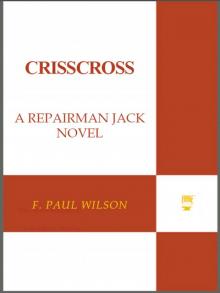 Crisscross
Crisscross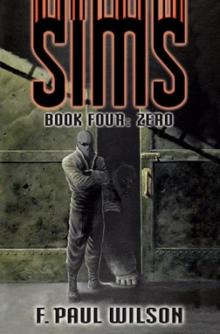 Ground Zero
Ground Zero Short Stories
Short Stories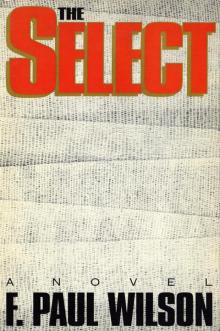 The Select
The Select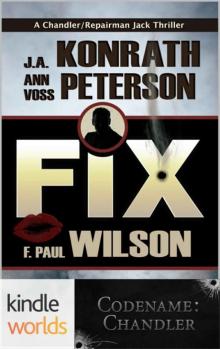 Codename
Codename Bloodline
Bloodline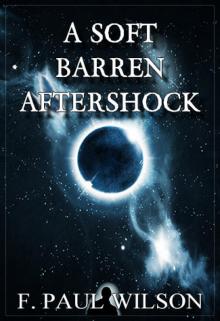 A Soft Barren Aftershock
A Soft Barren Aftershock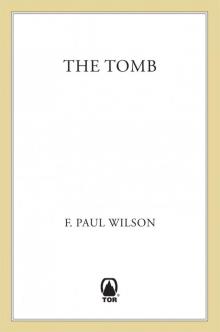 The Tomb
The Tomb The Complete LaNague
The Complete LaNague The Tery
The Tery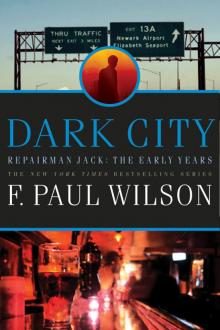 Dark City
Dark City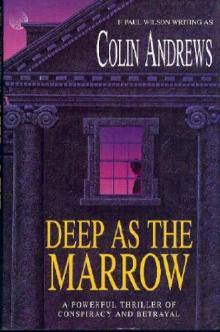 Deep as the Marrow
Deep as the Marrow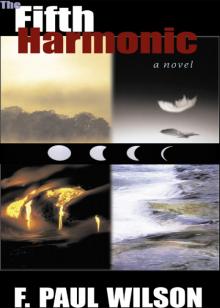 The Fifth Harmonic
The Fifth Harmonic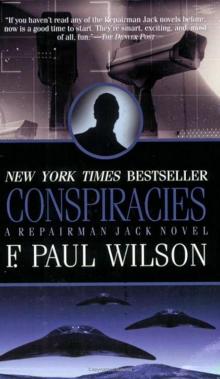 Conspiracies
Conspiracies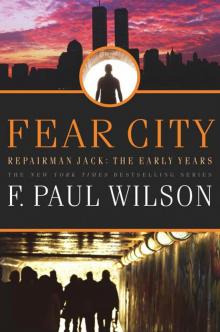 Fear City
Fear City Wheels Within Wheels
Wheels Within Wheels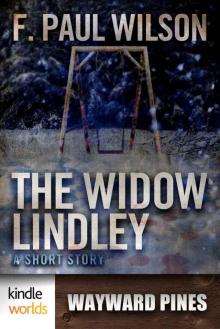 Wayward Pines
Wayward Pines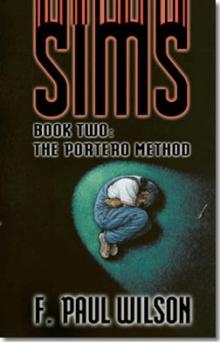 The Portero Method
The Portero Method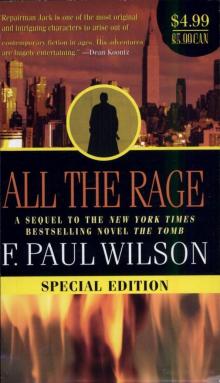 All the Rage
All the Rage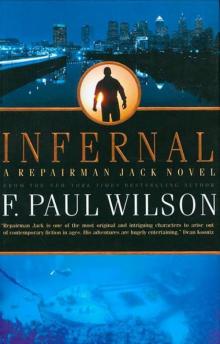 Infernal
Infernal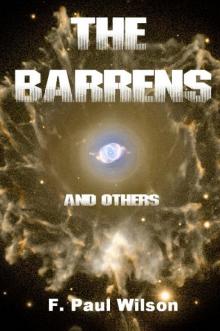 The Barrens & Others
The Barrens & Others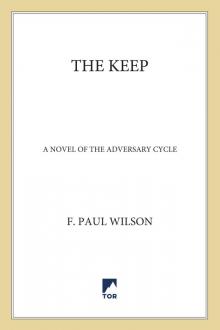 The Keep
The Keep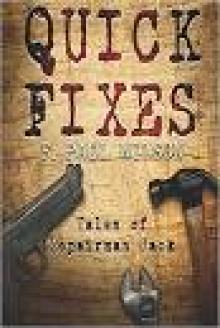 Quick Fixes: Tales of Repairman Jack
Quick Fixes: Tales of Repairman Jack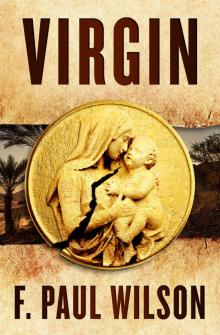 Virgin
Virgin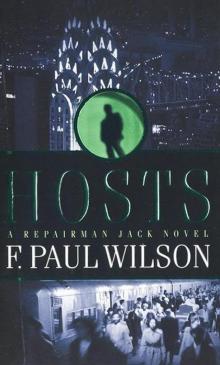 Hosts
Hosts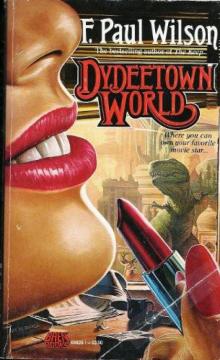 Dydeetown World
Dydeetown World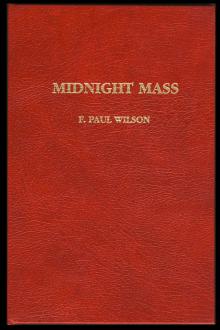 Midnight Mass
Midnight Mass Black Wind
Black Wind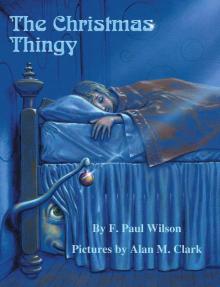 The Christmas Thingy
The Christmas Thingy The Last Rakosh
The Last Rakosh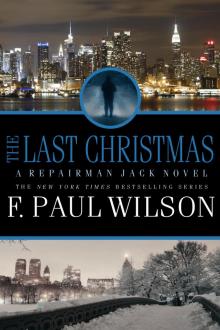 The Last Christmas: A Repairman Jack Novel
The Last Christmas: A Repairman Jack Novel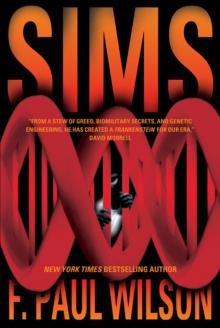 SIMS
SIMS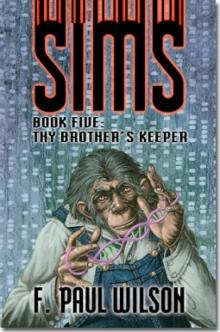 Thy Brother's Keeper
Thy Brother's Keeper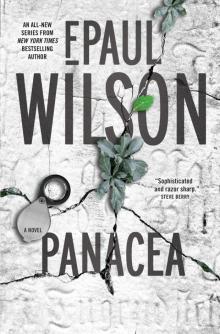 Panacea
Panacea The Touch
The Touch Scenes from the Secret History
Scenes from the Secret History Scenes From the Secret History (The Secret History of the World)
Scenes From the Secret History (The Secret History of the World)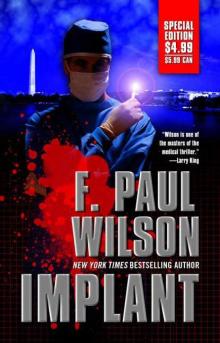 Implant
Implant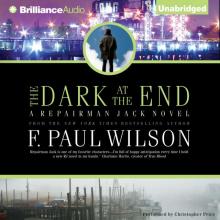 The Dark at the End
The Dark at the End Fatal Error
Fatal Error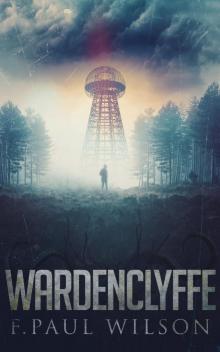 Wardenclyffe
Wardenclyffe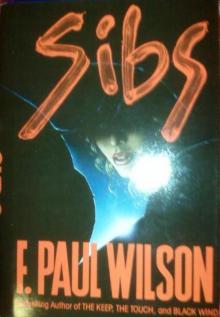 Sibs
Sibs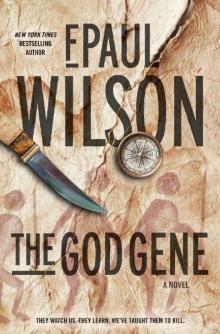 The God Gene
The God Gene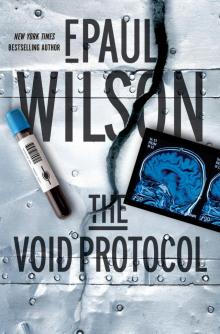 The Void Protocol
The Void Protocol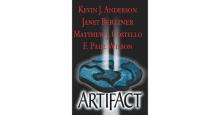 Artifact
Artifact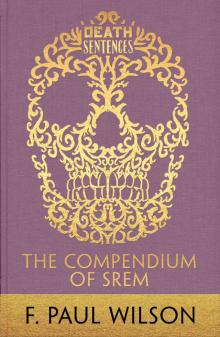 The Compendium of Srem
The Compendium of Srem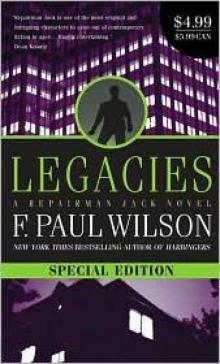 Legacies
Legacies Reprisal
Reprisal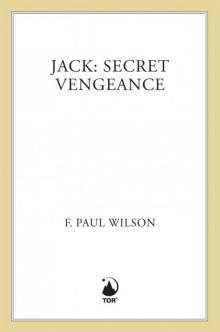 Jack: Secret Vengeance
Jack: Secret Vengeance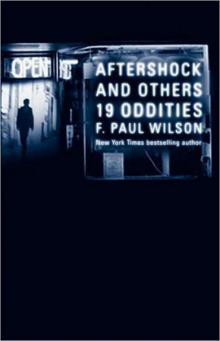 Aftershock & Others: 19 Oddities
Aftershock & Others: 19 Oddities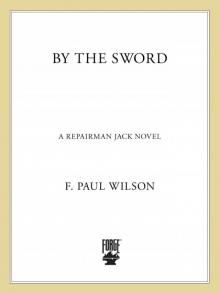 By the Sword
By the Sword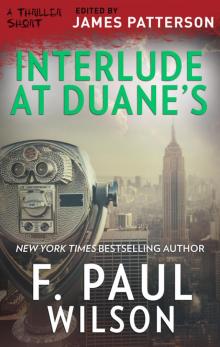 Interlude at Duane's (Thriller: Stories to Keep You Up All Night)
Interlude at Duane's (Thriller: Stories to Keep You Up All Night)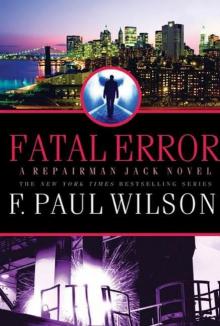 Fatal Error rj-13
Fatal Error rj-13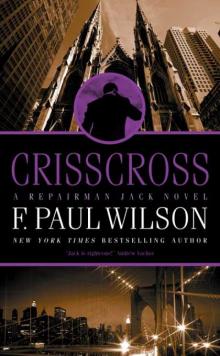 Crisscross rj-8
Crisscross rj-8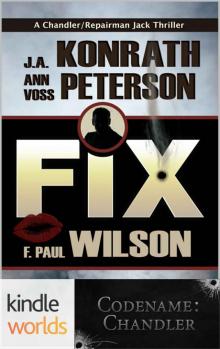 Codename: Chandler: Fix (Kindle Worlds Novella)
Codename: Chandler: Fix (Kindle Worlds Novella)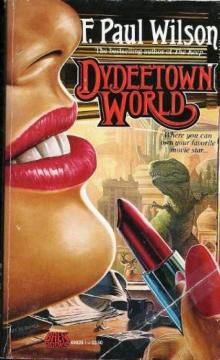 Dydeetown World lf-4
Dydeetown World lf-4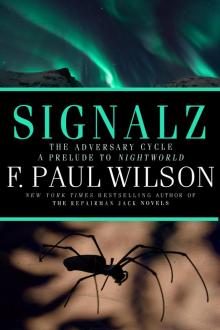 Signalz
Signalz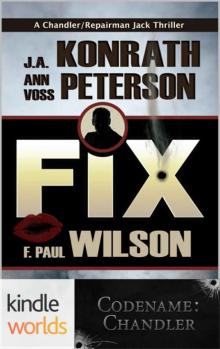 Codename_Chandler_Fix
Codename_Chandler_Fix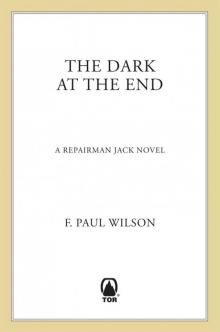 The Dark at the End (Repairman Jack)
The Dark at the End (Repairman Jack)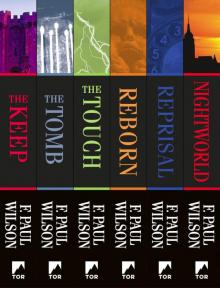 The Complete Adversary Cycle: The Keep, the Tomb, the Touch, Reborn, Reprisal, Nightworld (Adversary Cycle/Repairman Jack)
The Complete Adversary Cycle: The Keep, the Tomb, the Touch, Reborn, Reprisal, Nightworld (Adversary Cycle/Repairman Jack)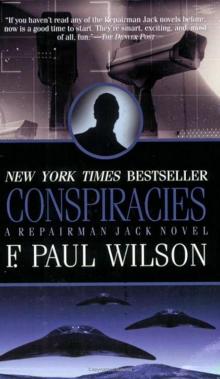 Repairman Jack 03 - Conspiracies
Repairman Jack 03 - Conspiracies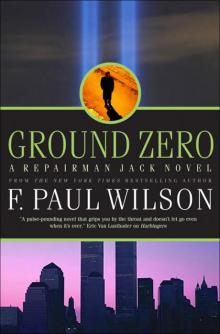 Ground Zero rj-13
Ground Zero rj-13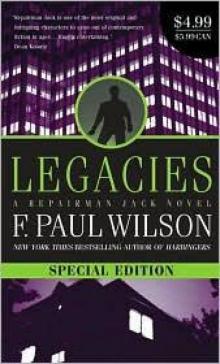 Repairman Jack 02 - Legacies
Repairman Jack 02 - Legacies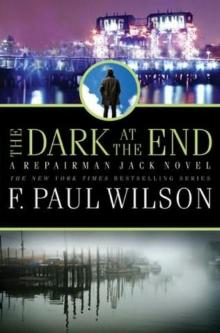 The Dark at the End rj-15
The Dark at the End rj-15![Repairman Jack [02]-Legacies Read online](http://i1.bookreadfree.com/i/03/21/repairman_jack_02-legacies_preview.jpg) Repairman Jack [02]-Legacies
Repairman Jack [02]-Legacies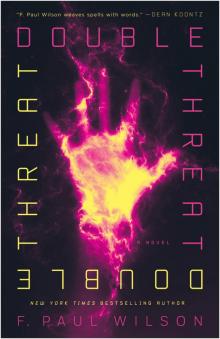 Double Threat
Double Threat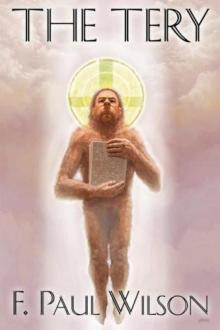 The Tery lf-5
The Tery lf-5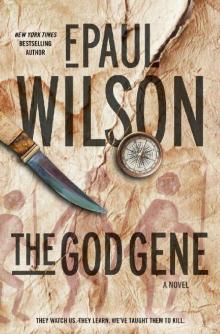 The God Gene: A Novel
The God Gene: A Novel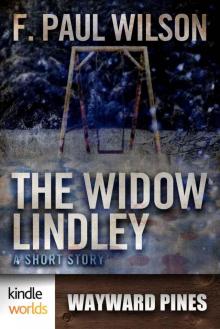 Wayward Pines: The Widow Lindley (Kindle Worlds Novella)
Wayward Pines: The Widow Lindley (Kindle Worlds Novella)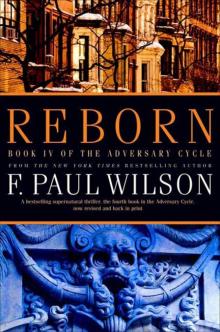 Reborn ac-4
Reborn ac-4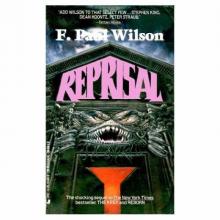 Reprisal ac-5
Reprisal ac-5 New Title 1
New Title 1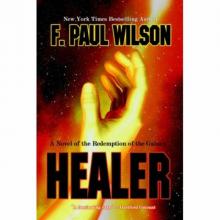 Healer lf-3
Healer lf-3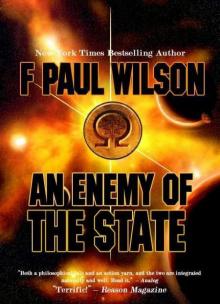 An Enemy of the State lf-1
An Enemy of the State lf-1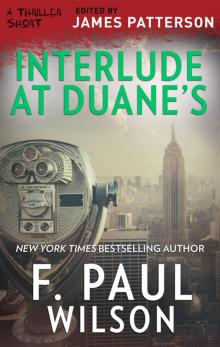 Interlude at Duane's
Interlude at Duane's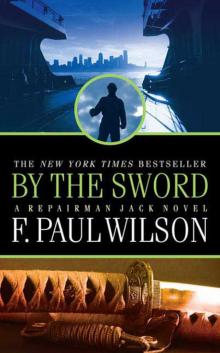 By the Sword rj-12
By the Sword rj-12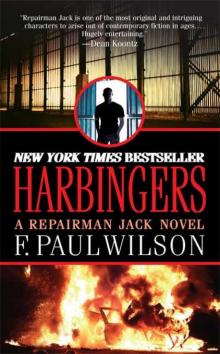 Hardbingers rj-10
Hardbingers rj-10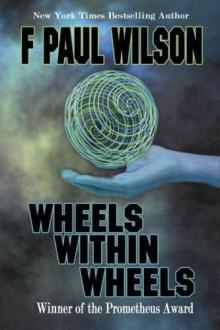 Wheels Within Wheels lf-2
Wheels Within Wheels lf-2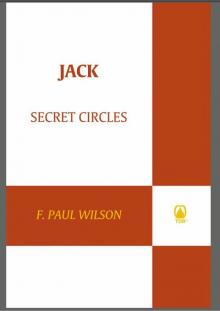 Jack: Secret Circles
Jack: Secret Circles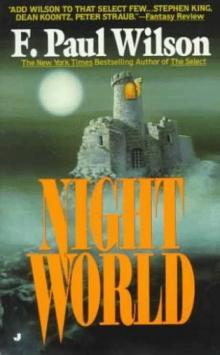 Nightworld ac-6
Nightworld ac-6 Quick Fixes - tales of Repairman Jack
Quick Fixes - tales of Repairman Jack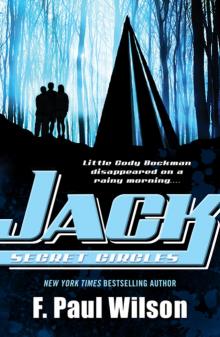 Secret Circles yrj-2
Secret Circles yrj-2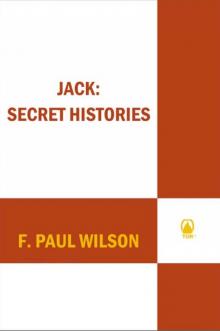 Jack: Secret Histories
Jack: Secret Histories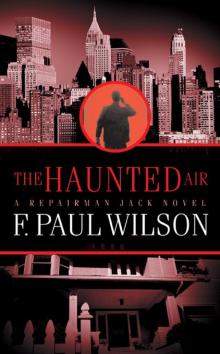 Haunted Air rj-6
Haunted Air rj-6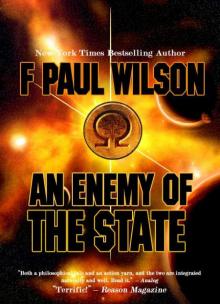 An Enemy of the State - a novel of the LaNague Federation (The LaNague Federation Series)
An Enemy of the State - a novel of the LaNague Federation (The LaNague Federation Series)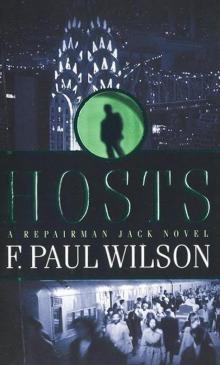 Repairman Jack 05 - Hosts
Repairman Jack 05 - Hosts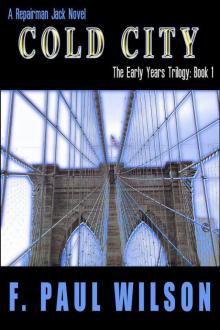 Cold City (Repairman Jack - the Early Years Trilogy)
Cold City (Repairman Jack - the Early Years Trilogy)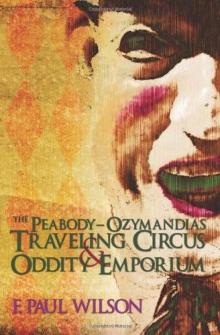 The Peabody-Ozymandias Traveling Circus & Oddity Emporium
The Peabody-Ozymandias Traveling Circus & Oddity Emporium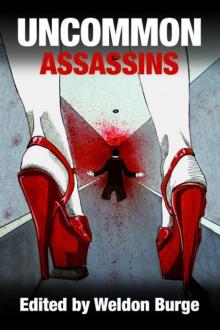 Uncommon Assassins
Uncommon Assassins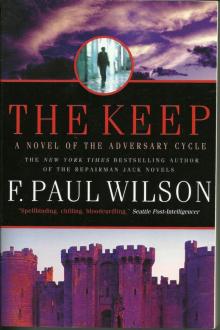 Adversary Cycle 01 - The Keep
Adversary Cycle 01 - The Keep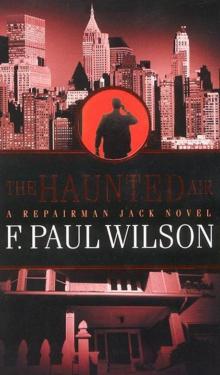 Repairman Jack 06 - The Haunted Air
Repairman Jack 06 - The Haunted Air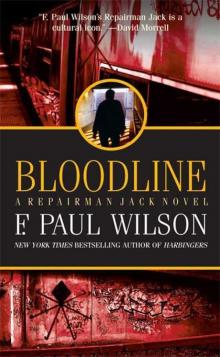 Bloodline rj-11
Bloodline rj-11 Ultimate Supernatural Horror Box Set
Ultimate Supernatural Horror Box Set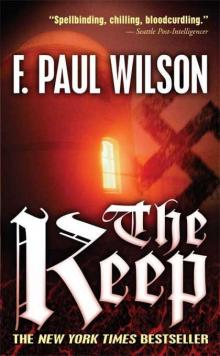 The Keep ac-1
The Keep ac-1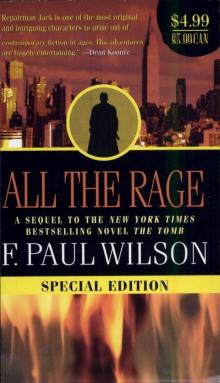 Repairman Jack 04 - All the Rage
Repairman Jack 04 - All the Rage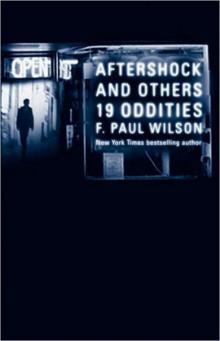 Aftershock & Others
Aftershock & Others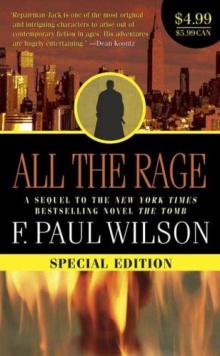 All the Rage rj-4
All the Rage rj-4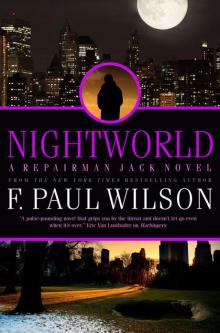 Nightworld (Adversary Cycle/Repairman Jack)
Nightworld (Adversary Cycle/Repairman Jack)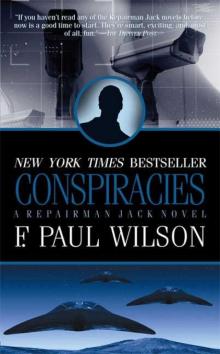 Conspircaies rj-3
Conspircaies rj-3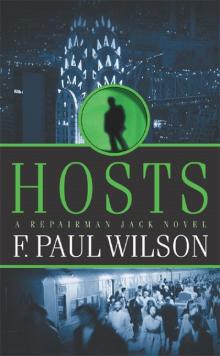 Hosts rj-5
Hosts rj-5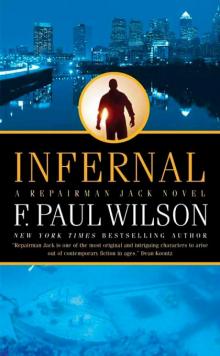 Infernal rj-9
Infernal rj-9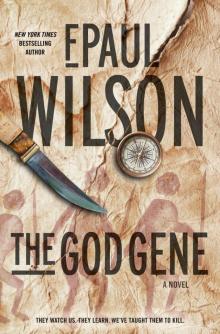 The God Gene: A Novel (The ICE Sequence)
The God Gene: A Novel (The ICE Sequence)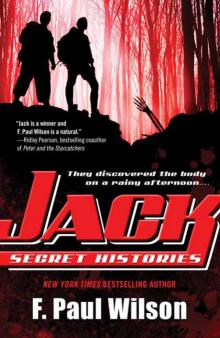 Secret Histories yrj-1
Secret Histories yrj-1